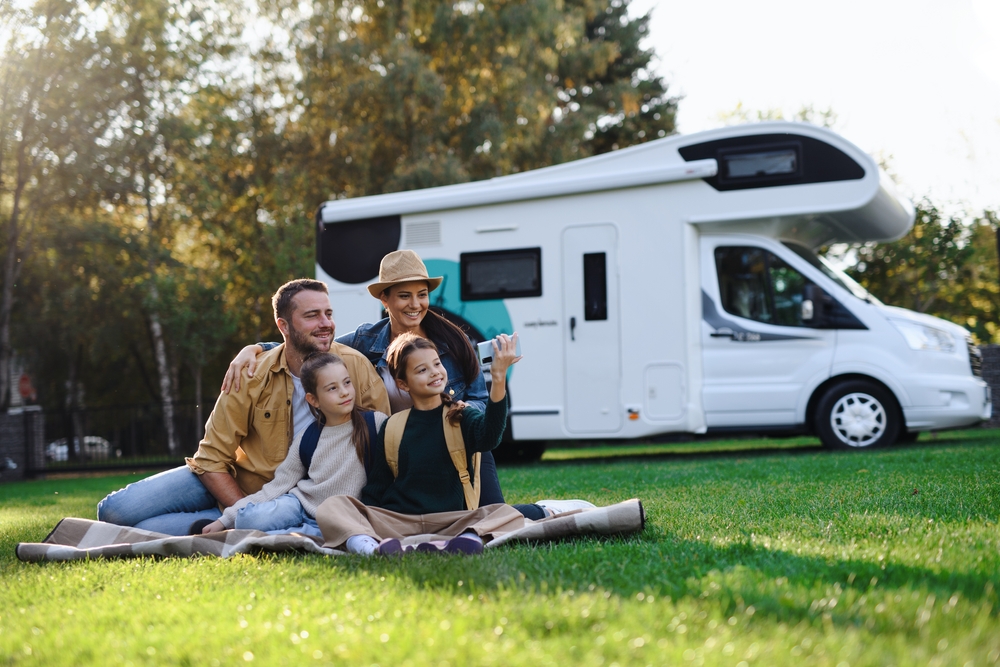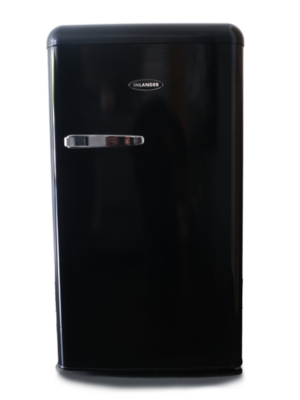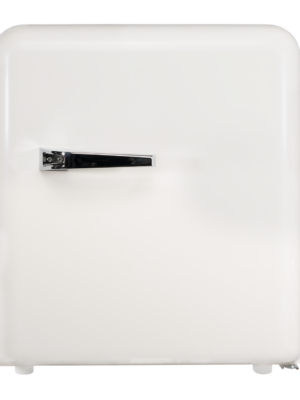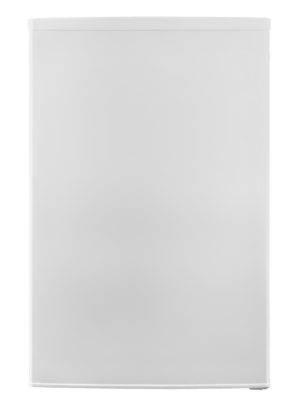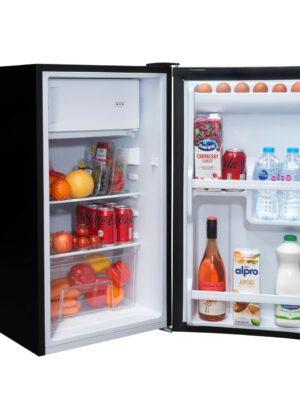Living in a motorhome can offer many benefits, especially with the rising cost of living. But can you live permanently in a motorhome and what electrical appliances will you need for comfortable living?
Can You Live Permanently in a Motorhome?
You can live permanently in a motorhome in the UK, however, it’s important to understand the legal and practical considerations before attempting to do so.
You cannot park your motorhome permanently on public roads, car parks or laybys, so you need to make sure you have private land – or permission from the land owner – to keep your motorhome on if you’re intent on living in one location full-time. You can also get permission from campsites to stay for a long time, but this is never usually a permanent move and you’ll need to check with the campsite owner how long you can stay there for.
But one of the main benefits of living in a motorhome is the freedom to move, so even if you’re staying in one location for the long term, you’ve still got the freedom to hit the road and have a short break elsewhere before returning to your land or campsite. One benefit of a campsite over moving from road to road or staying on private land is that there’s access to important utilities from water to electricity and waste disposal.
Before starting to live in a motorhome, you should also consider your legal address for your post, voting, and other legal responsibilities, as well as whether your vehicle is insured for full-time living.
Although it is technically legal to live permanently in your motorhome, there are plenty of aspects of your new life that you’ll need to consider, so make sure you’re fully prepared and check the regulations of your local council before finding yourself in any difficulties.
Is it the Same in Europe?
Similarly, you can live permanently in your motorhome in Europe, but you’ll need to make sure you comply with local regulations regarding how often and how long you park in a certain area. France has a number of ‘aires’ similar to campsites but usually for vehicles rather than tents, which are very motorhome-friendly with access to water, electricity and usually toilets, but you may not be able to stay there permanently.
As a British citizen, you also need to remember that you can only stay in the Schengen Area for up to 90 days in any 180-day period, so you will have to return to the UK or move to a non-Schengen country such as Turkey for 90 days before returning to Schengen Area countries. If you do plan to move around a lot, make sure you also comply with post-Brexit regulations on what you’re transporting to and from EU countries as you may face additional checks at borders.
Advantages of Living in a Motorhome
Although you’ll naturally have plenty of legal and practical considerations when deciding whether to live in a motorhome permanently or not, this style of living is becoming increasingly popular due to the numerous advantages it holds.
Some of the main advantages of living in a motorhome include:
- Flexibility
- Freedom
- Reduced cost of living
- Minimalism
- Connection with nature
- Reduced environmental impact
One of the most significant benefits is the ability to travel and explore new places at your own pace, with everything you need at your fingertips. You can wake up to different views every day, from beaches to mountains, without that end-of-holiday feeling of having to return home.
Although you will, of course, encounter some significant expenses, from buying the motorhome in the first place, to regular refuelling, road tax, insurance and standard costs of living such as food and drink, your expenses are likely to be significantly less than living in a traditional home.
From saving on rent or mortgage payments to reduced utility bills, your motorhome will likely save you a lot of money. Not to mention that living in a motorhome teaches you to be more resourceful and simplify your life, saving money along the way. Plus, you’re able to travel at your own pace without the costs of hotels or restaurants.
Minimalism not only saves you money, but also allows you to simplify your life and connect with the aspects of life that really matter; connecting with people, nature and your hobbies, as you spend more time outside and in remote natural areas.
Although you will be consuming fuel as you drive from place to place, motorhomes often have a smaller environmental footprint compared to traditional homes. They typically use less energy in terms of heating and electricity and encourage mindful consumption of resources.
Electricals You’ll Need in Your Motorhome
Outfitting a motorhome with the right electrical systems and appliances is essential for comfort, convenience, and functionality. A well-equipped motorhome ensures that you can enjoy the conveniences of home while on the road.
Essential appliances enhance the living experience in a motorhome. LED lights are energy-efficient and provide ample illumination, while adjustable reading lamps are perfect for focused tasks. A refrigerator keeps food fresh and can operate on multiple power sources, including 12V DC, 240V AC, and gas.
Cooking appliances like an oven, hob or stove top and microwave are needed for meal preparation and you can choose one or two depending on your space and cooking needs so think about which one is more useful for you.
As well as insulating your vehicle, you may also want heating for comfortable temperatures all year round, as well as to heat your water for your showers and washing.
You may also wish to have some home comforts in your motorhome if you’re planning to live there permanently, such as a TV, speaker system and charging points for laptops and mobiles. You can even install a Wi-Fi router for constant internet access.
Other electrical appliances that aren’t strictly necessary but can enhance your experience include:
- A washing machine
- Coffee machine
- Electric awning
Ultimately, it’s your choice which electrical appliances you have, especially if you’re converting a van yourself. But put safety first and make sure you have smoke and carbon monoxide detectors in your motorhome.
How Do You Power Your Motorhome?
Powering a motorhome effectively involves combining multiple energy sources to ensure a reliable supply of electricity for all your needs.
Deep cycle batteries, separate from the vehicle’s starter battery, power the living area and are designed for sustained power, making them ideal for motorhome use. An inverter converts DC power from these batteries to AC power, allowing the use of household appliances.
Solar panels can be of great use, providing a renewable energy source to charge the batteries, reducing reliance on external power and charging the deep cycle batteries while the sun is out, so your vehicle’s alternator can simply charge the leisure batteries while driving, ensuring they remain topped up during travel.
By integrating these electrical systems and appliances, a motorhome can be transformed into a comfortable, functional, and self-sufficient living space, ensuring that all the conveniences of home are available while travelling.
Combining these methods ensures a balanced, reliable, and efficient power system for your motorhome, catering to both on-grid and off-grid living.
Powering a Fridge in Your Motorhome
A compressor fridge is an excellent choice for motorhomes due to its efficiency and reliability. These fridges operate similarly to household models, using a compressor and refrigerant to maintain consistent and low temperatures. Unlike absorption fridges, compressor fridges perform well in hot climates and on uneven surfaces, offering greater reliability.
Compressor fridges are energy-efficient, especially when powered by 12V DC from leisure batteries, making them suitable for off-grid living. With lower maintenance needs, they are less prone to issues compared to absorption fridges that use gas.
To power a compressor fridge in a motorhome, you can use 12V DC while driving, as the vehicle’s alternator can keep the leisure batteries charged. At campsites with mains electricity, switching to 240V AC ensures continuous power without draining the batteries.
These options can be more expensive but are certainly worthwhile for use in motorhomes, so make sure you shop around and choose the best 12V fridge for your vehicle.
Inlander Low Voltage
Inlander Low Voltage is a small family-run business that provides high-quality 12V goods including fridges for use in motorhomes. Check out our guide to furnishing motorhomes, or shop for fridges now!

